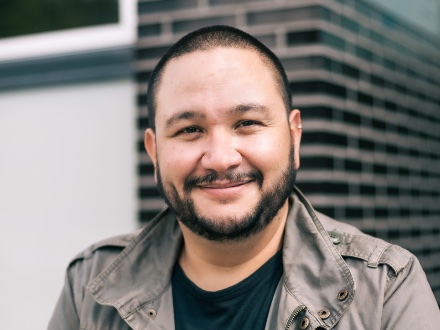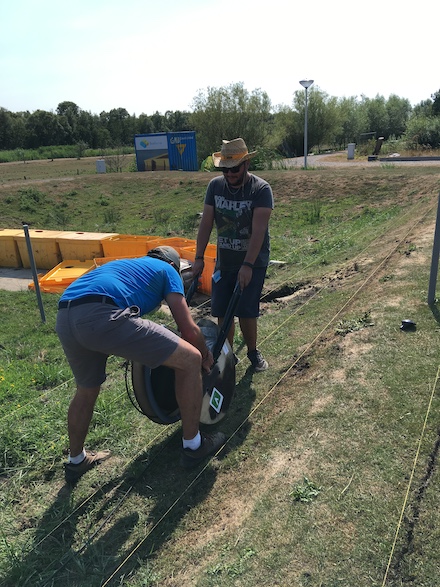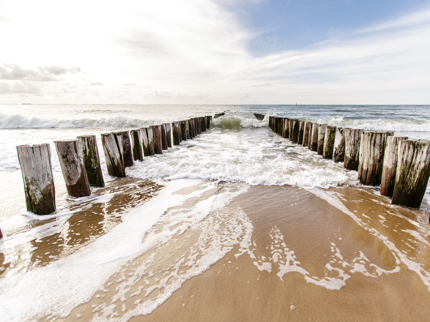 Assistant professor on Structural Flood Resilience Juan Aguilar López from TU Delft is becoming an increasingly familiar face within DigiShape. Facilitating several AI working group sessions with his colleague José A.A. Antolinez and giving talks about flood risk and dike resilience, he is actively contributing to the community. We interviewed him about his work, how machine learning based surrogate modelling works and what he thinks is the potential of DigiShape.
Assistant professor on Structural Flood Resilience Juan Aguilar López from TU Delft is becoming an increasingly familiar face within DigiShape. Facilitating several AI working group sessions with his colleague José A.A. Antolinez and giving talks about flood risk and dike resilience, he is actively contributing to the community. We interviewed him about his work, how machine learning based surrogate modelling works and what he thinks is the potential of DigiShape.
Juan, tell us about your work. What is your focus?
“I work at the Faculty of Civil Engineering and Geosciences at TU Delft, specifically in the section of Hydraulic Engineering. My focus revolves around flood resilience and adapting the Netherlands to potential flooding scenarios leveraging on technology. As an assistant professor, my goal is to use machine learning and sensors to develop and feed surrogate models, enabling faster flood and dike failure simulations. I work together a lot with José A.A. Antolinez, another well known face within the DigiShape community. While our work diverges significantly (he concentrates on coastal systems, while I specialize in dikes and rivers), we find substantial common ground, collaborating in our daily tasks and across various projects.”
You have held talks about surrogate models at several DigiShape events. What are they?
“A surrogate model is a simplified and computationally efficient approximation of a complex, time-consuming simulation or mathematical model. It serves as a substitute, providing rapid insights and predictions of a system while reducing the need for resource-intensive computations. We make these models using machine learning, feeding them with data generated from already existing physics based models.”
How do surrogate models help the water sector?
 Image: Juan installing fiber optic cables in a dike to monitor it with surrogate models
Image: Juan installing fiber optic cables in a dike to monitor it with surrogate models
“Currently, the water sector possesses robust models capable of simulating floods, but they still demand significant computational time and sometimes even simplifications. My aspiration is to develop a highly detailed but computationally efficient models, enabling the rapid simulation of flooding in the Netherlands without requiring high performance computing facilities. This approach facilitates evaluating a significant amount of flooding scenarios, aiding the water sector to have a broader view in climate change mitigation. For instance, determining the optimal location for a retaining wall, or a sewer pipe for example, requires multiple model runs, which is time-consuming and often not as many as we wish. Accelerating this process would enhance uncertainty quantification in our predictions. Currently, many analyses are not conducted, not because dutch specialist are not aware of them, but due to their time-intensive nature. Hence, probabilistic aproximations are often the way to go. Additionally, the abundance of available data today and the power of deep learning technology for example allows us to incorporate decades of expert knowledge in our models.”
What potential do you see in DigiShape?
“Well, firstly it's a funded group with practical skills that provides a platform for developing topics aligned with the industry's needs and challenges. We can address knowledge gaps and contribute to problem-solving, fostering valuable collaboration from experts in diverse water topics from academia, governments, and industry. Equally significant is our focus on learning to share data. While I understand my data, I often lack insight into others' datasets availability – their storage format, collection methods, instruments used, measurement uncertainty and models applied. Many companies invest heavily in purchasing data, unaware that they might already have access to relevant information. With José and the people from DigiShape, we all agree on that establishing a repository for sharing data could significantly aid in addressing questions we may not even be aware other people are also solving.”
What are the challenges you see for DigiShape and digitization of the water sector?
"There are a couple of challenges that we need to address. First, there are common misconceptions about machine learning. People often see it as a magical solution that can solve any problem, while underestimating the problem or the amount of data required to solve it. It's important to understand and communicate clearly it's limitations. Users should possess in-depth knowledge of the field relevant knowledge so that machine learning and AI is used to its full capability. Machine learning is a powerful tool, but sometimes it's not the right fit for every problem. Bear in mind that having data is not equivalent to having information.
Secondly, we need to overcome a critical point where discussions transition into actionable steps. It's not enough to just talk about the potential of digitization and data sharing; we need to become more proactive. All actors must be willing to implement, evaluate and criticize if necessary, the solutions rather than using the old “this is too much of a black box” old fashioned argument. Overcoming this hurdle will be essential for realizing the true benefits of DigiShape and advancing the water sector through digitization."

Image above: screenprint from an experiment that Thomas Stolp (HKV) and Juan did for flood surrogate modeling based on machine learning.
What makes your job the most fun in the world?
“I find immense satisfaction in the creative freedom and flexibility that comes with my role. Firstly, as a researcher and assistant professor, I have the autonomy to explore topics that intrigue me, allowing for continuous intellectual growth. Secondly, I can inspire students to “dip their hands in the mud” as machine learning is heavily based on matrix algebra, statistics and calculus; all subjects studied in their early years of engineering. Moreover, I feel can really contribute to meaningful changes in society by promoting its responsible use. And thirdly, the one I often say as a joke: there's nothing that will make you fall in love with your job more than a kid and a mortgage.”
More information
- You can contact Juan at Dit e-mailadres wordt beveiligd tegen spambots. JavaScript dient ingeschakeld te zijn om het te bekijken.

